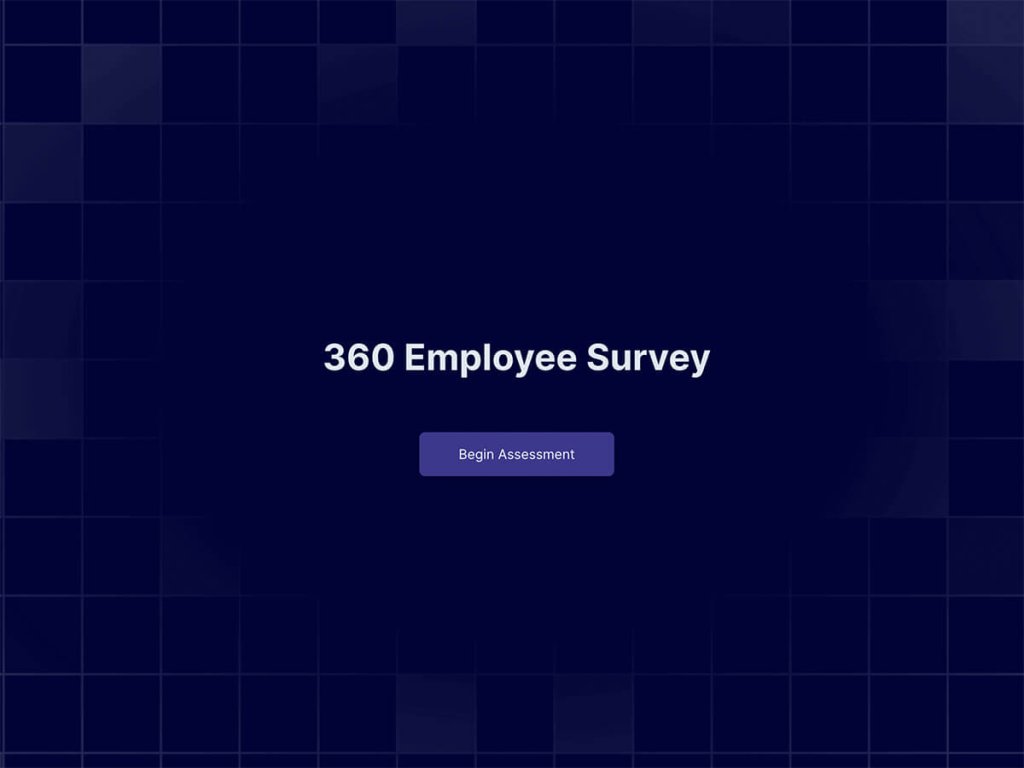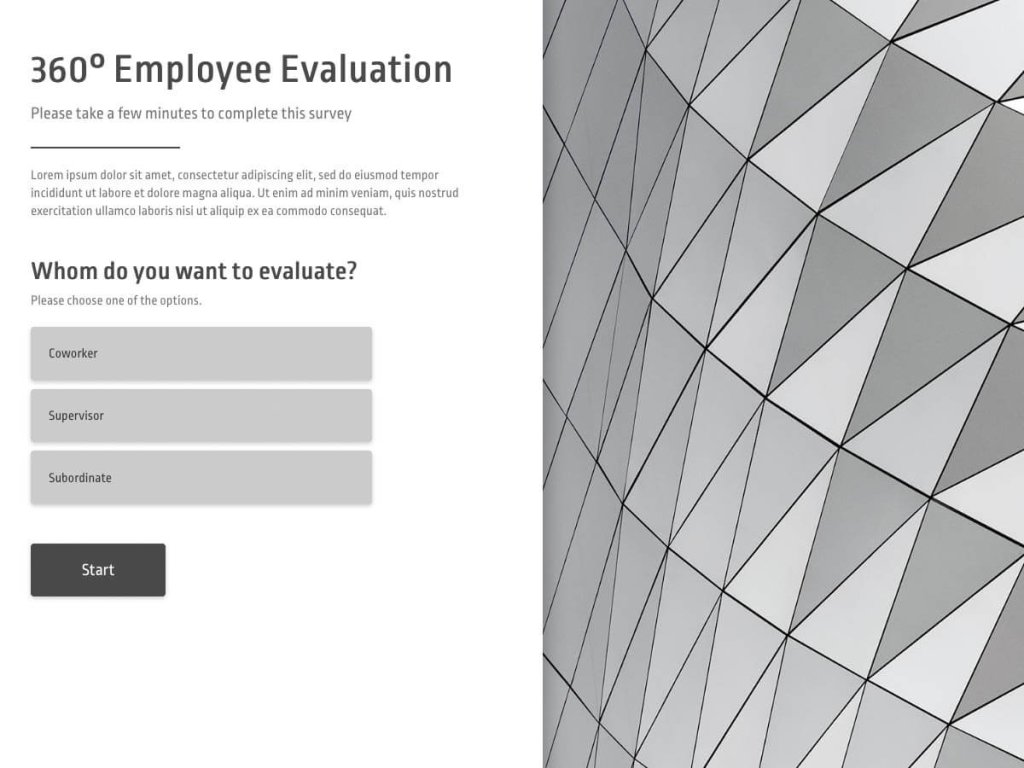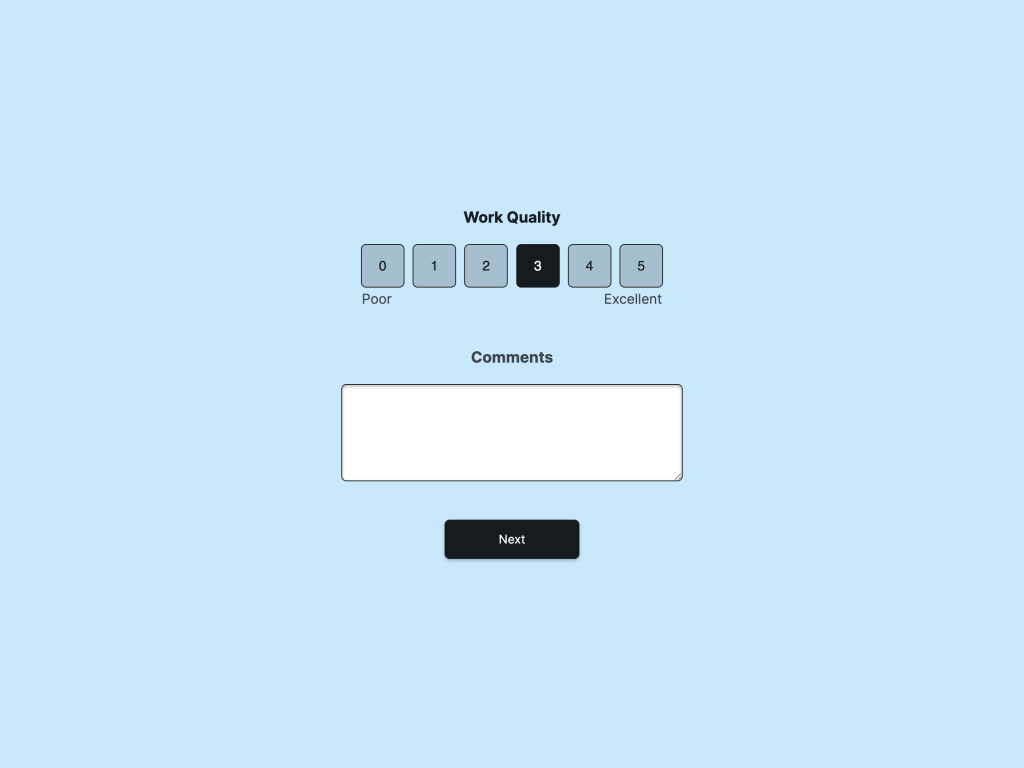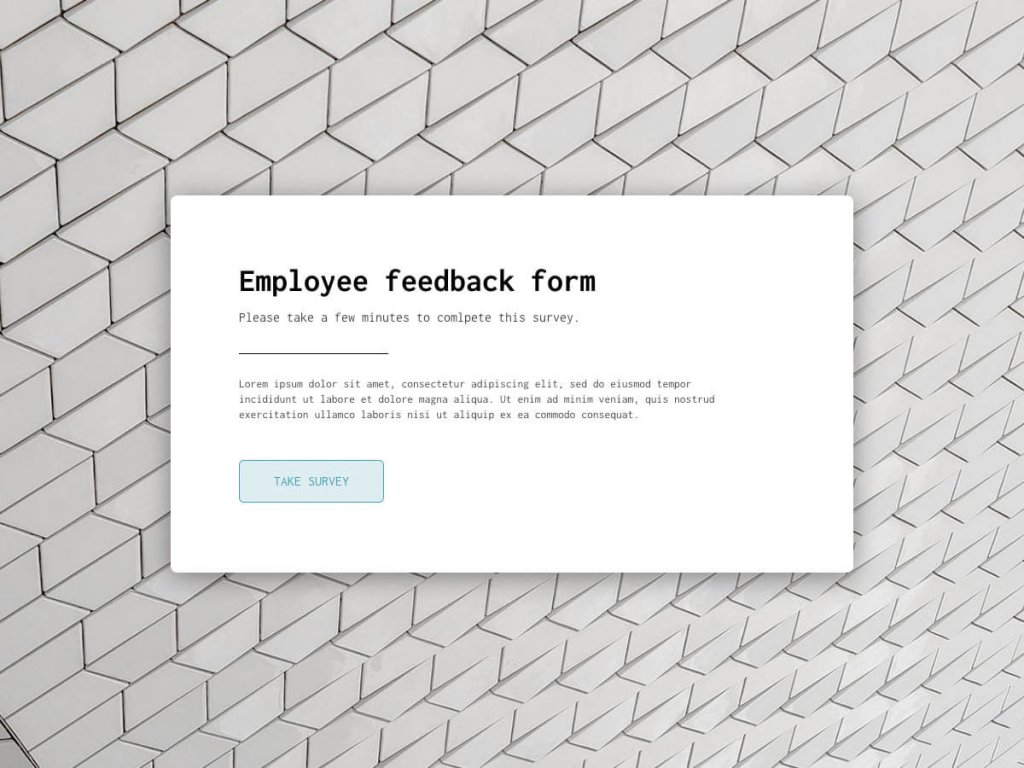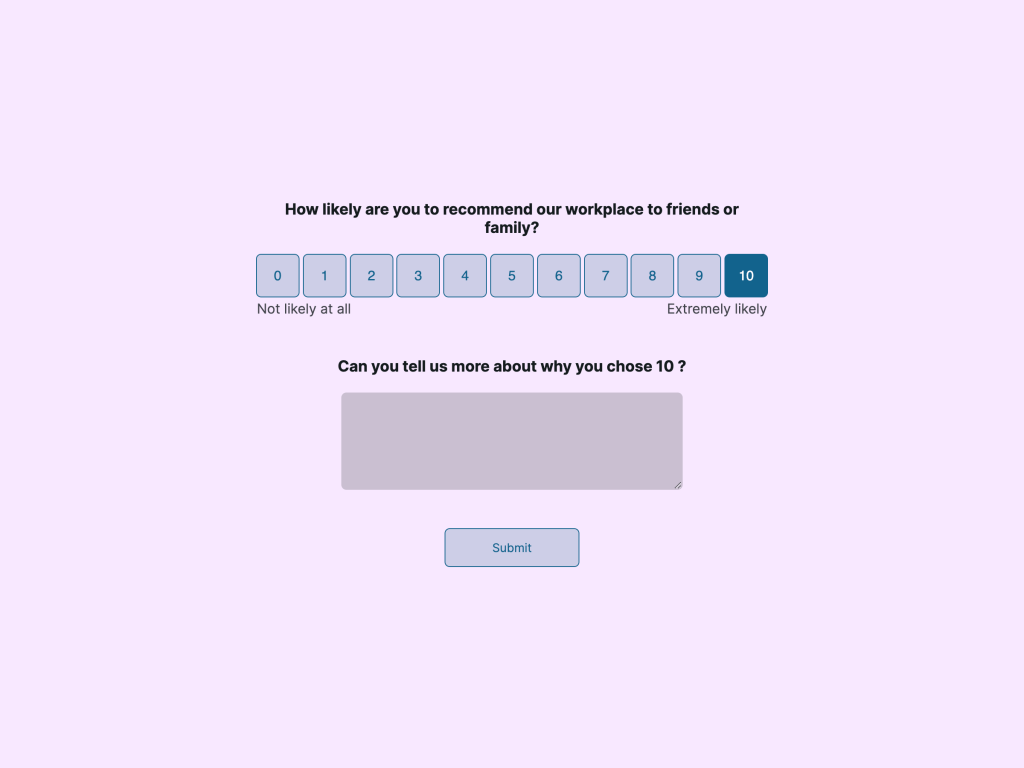Employee feedback is a foundation of organizational success and individual growth. It serves as a critical tool that organizations use to enhance engagement, streamline operations, and foster professional development among their staff. In fact, companies can make informed decisions by collecting and acting upon feedback that drive productivity, improve employee morale, and align individual aspirations with organizational goals.
This article provides a comprehensive set of structured questions designed for managers, peers, and subordinates to use in their evaluations. Covering various aspects from performance and teamwork to leadership and organizational culture, these questions are presented in diverse formats including multiple-choice, ratings, and open-ended responses.
Types Of Employee Feedback Forms
Employee feedback forms come in various types, each designed to serve specific purposes and provide valuable data to both the employer and the employee. Here are some common types of employee feedback forms:
Performance Evaluations
Performance evaluations are traditional forms used to assess an employee’s work performance over a specific period. These evaluations typically focus on metrics such as the quality of work, achievement of goals, and professional behavior. Managers often use these forms during annual or semi-annual review meetings to discuss the employee's strengths, areas for improvement, and potential career paths. The feedback gathered is used to make decisions about promotions, pay raises, and career development opportunities.
360-Degree Feedback
The 360-degree feedback system is a more comprehensive approach where employees receive confidential, anonymous feedback from the people who work around them. This typically includes peers, managers, and direct reports. The purpose is to provide a holistic view of the employee’s skills, performance, and teamwork capabilities, eliminating biases that can occur in traditional managerial reviews. 360-degree feedback is particularly valuable for personal and professional development, helping individuals understand how their effectiveness as employees or leaders is viewed by others.
Employee Satisfaction Surveys
Employee satisfaction surveys are used to gauge how happy and content employees are with various aspects of their workplace environment. These surveys cover topics such as job satisfaction, workplace relationships, management style, and company policies. The feedback obtained can highlight areas where the organization is excelling or failing to meet employee expectations, guiding organizational changes and strategies to improve workplace culture and employee retention.
Employee Net Promoter Score (eNPS) Surveys
eNPS surveys measure how likely employees are to recommend their workplace to friends or acquaintances. This metric provides valuable insight into overall employee satisfaction and loyalty, making it a crucial indicator of organizational health.
These surveys are concise, usually consisting of one main question supplemented by a few follow-up questions to gather context on the score given. The simplicity of eNPS allows for quick analysis and response to employee sentiment, helping organizations swiftly implement changes to improve morale and reduce turnover rates.
Employee Training Feedback
Feedback forms for employee training sessions help assess the effectiveness of the training provided and measure how well it meets the needs of the employees. These forms are usually distributed at the end of a training session and ask participants to evaluate the content, presentation, and applicability of the training to their daily tasks.
Remote Work Feedback
As remote work becomes more common, remote work feedback forms are used to evaluate employees' home office setups, their experiences with remote work, and the support they receive from the organization. These surveys can be periodic or triggered by changes in remote work policies or tools, asking about aspects such as work-life balance, communication efficiency, and technical support.
The feedback helps organizations adjust policies, provide better support, and ensure that remote teams are productive, satisfied, and well-integrated into company culture.
100+ Employee Feedback Form Questions and Answers
Here are 100 diverse types of employee feedback form questions and answers, encompassing multiple-choice questions (MCQs), rating scales, open-ended questions, and more.
Questions for Employee Self-Evaluation
Self-assessment of Performance:
1.On a scale from 1 to 5, how would you rate your overall performance this past year?
(1 = Poor, 5 = Excellent)
2.What do you consider your biggest achievement this year and why?
3.Which of the following best describes your time management skills?
a) Always meet deadlines
b) Frequently meet deadlines
c) Occasionally meet deadlines
d) Struggle with deadlines
4.Describe a project or task where you feel you could have performed better. What would you do differently?
5.Did you take on any leadership roles this year? Please provide examples if your answer is 'Yes'.
Skill Development and Training Needs:
6.Which skills would you like to develop or improve? (Check all that apply)
a) Technical skills
b) Communication skills
c) Leadership skills
d) Project management
e) Other (Please specify)
7.Describe a situation this year where you felt under-prepared. What training would have helped you?
8.How adequate is the current training and development support at the company?
(1 = Not at all adequate, 5 = Extremely adequate)
9.What type of training do you prefer?
a) Online courses
b) In-person workshops
c) On-the-job training
d) Peer-led training sessions
10.What are your specific goals for professional development in the coming year?
Career Aspirations:
11.Where do you see yourself in the next 3-5 years?
a) In a similar role
b) In a managerial role
c) In a different department
d) Seeking opportunities outside the company
12.What are your long-term career objectives and how do you plan to achieve them?
13.Are you interested in leadership training?
14.How motivated are you to advance to a higher position within the organization?
(1 = Not motivated, 5 = Extremely motivated)
15.What can the organization do to better support your career aspirations?
16.Select the department you would be interested in transitioning to if given an opportunity:
Marketing
Sales
Human Resources
IT
Other (Please specify)
17.Describe any specific roles or projects you are interested in pursuing within the company.
18.How important is career advancement to you?
a) Very important
b) Somewhat important
c) Neutral
d) Not very important
19.How do you align your career goals with the company’s goals?
20.Would you be open to relocating if it meant advancing in your career?
Questions for Managerial Feedback
Evaluating Employee Performance:
21.On a scale of 1 to 10, how would you rate the employee's overall performance this year?
22.How consistently does the employee meet their project deadlines?
a) Always
b) Often
c) Sometimes
d) Rarely
23.Can you describe a specific project that highlights the employee's capabilities?
24.Has the employee achieved their performance goals set at the beginning of the year?
25.What area of performance has the employee improved most in this year?
Quality of work
Speed
Creativity
Reliability
Feedback on Teamwork and Collaboration:
26.How well does the employee collaborate with others?
a) Exceptionally well
b) Adequately
c) Needs improvement
d) Poorly
27.Rate the employee's ability to support team members.
(1 = Poor, 10 = Excellent)
28.Provide an example of how the employee has contributed to team cohesion.
29.What teamwork skills does the employee excel at? (Check all that apply)
Communication
Conflict resolution
Peer support
Sharing responsibilities
30.Does the employee take initiative in team meetings?
Leadership and Initiative:
31.Describe how the employee has displayed leadership qualities within their role.
32.How effectively does the employee manage project responsibilities when in a leading role?
(1 = Not effectively, 10 = Very effectively)
33.What type of leadership style does the employee typically use?
a) Authoritative
b) Participative
c) Delegative
d) Laissez-faire
34.Has the employee demonstrated innovative solutions to problems?
35.What initiative has the employee taken that significantly impacted the department?
36.How proactive is the employee in identifying and solving problems before they escalate?
a) Extremely proactive
b) Moderately proactive
c) Seldom proactive
d) Not proactive
37.Rate the employee’s ability to inspire and motivate others.
(1 = Not at all inspiring, 10 = Highly inspiring)
38.Can you describe an instance where the employee demonstrated exceptional initiative?
39.Does the employee actively seek leadership roles in projects?
40.In which area would you like to see the employee show more leadership?
Decision-making
Team management
Creative initiatives
Organizational tasks
Questions for Peer Feedback
Interpersonal Skills:
41.How would you rate the employee's communication skills?
(1 = Poor, 10 = Excellent)
42.How approachable is the employee?
a) Very approachable
b) Somewhat approachable
c) Rarely approachable
d) Not approachable
43.Can you provide an example of effective communication by the employee?
44.Does the employee respect differing opinions?
45.Select the employee's most noticeable interpersonal skill:
Empathy
Active listening
Assertiveness
Persuasiveness
Reliability and Dependability:
46.How reliable is the employee with completing tasks on time?
a) Always reliable
b) Usually reliable
c) Occasionally reliable
d) Unreliable
47.Rate the employee's consistency in daily responsibilities.
(1 = Very inconsistent, 10 = Highly consistent)
48.Describe a situation where the employee showed exceptional dependability.
49.Can the employee be depended on in critical situations?
50.Which aspects of dependability does the employee excel at? (Check all that apply)
Timeliness
Consistency
Accountability
Thoroughness
Contribution to Team Success:
51.How does the employee contribute to achieving team goals?
52.Evaluate the employee's role in team successes.
(1 = Minimal contribution, 10 = Key contributor)
53.Which of the following best describes the employee's contribution to the team?
a) Leader
b) Supporter
c) Innovator
d) Coordinator
54.Does the employee actively participate in team strategy sessions?
55.Which aspect of the team success does the employee most positively impact?
Planning
Execution
Morale
Innovation
56.How effectively does the employee handle feedback from team members?
a) Very effectively
b) Effectively
c) Ineffectively
d) Very ineffectively
57.How valuable is the employee's contribution to brainstorming sessions?
(1 = Not valuable, 10 = Extremely valuable)
58.Provide an example where the employee played a vital role in a team project.
59.Does the employee recognize and acknowledge the contributions of others in the team?
60.Which team role suits the employee best?
Innovator
Mediator
Executor
Planner
Questions for Subordinate Feedback
Management Style:
61.How would you describe the manager's leadership style?
a) Directive
b) Coaching
c) Supporting
d) Delegating
62.How effective is the manager in providing clear direction?
(1 = Not effective, 10 = Highly effective)
63.What do you appreciate most about the manager's approach to leadership?
64.Does the manager adapt their leadership style to meet team needs?
65.What is the most significant area for improvement in the manager's leadership style?
Communication
Flexibility
Decision-making
Empowerment
Support and Guidance:
66.Rate how supportive the manager is in your daily work.
(1 = Not supportive, 10 = Very supportive)
67.How accessible is the manager when you need help or guidance?
a) Always accessible
b) Often accessible
c) Seldom accessible
d) Never accessible
68.Can you provide an example of how the manager has helped in your professional growth?
69.Does the manager provide regular and constructive feedback?
70.What types of support do you receive from your manager? (Check all that apply)
Emotional support
Career growth
Resource allocation
Career advice
Open Communication:
71.How would you rate the manager's communication clarity?
a) Very clear
b) Somewhat clear
c) Not very clear
d) Unclear
72.How open is the manager to receiving feedback from subordinates?
(1 = Not open, 10 = Very open)
73.Describe a situation where open communication with the manager led to a positive outcome.
74.Does the manager encourage open dialogue in meetings?
75.What could improve in the manager's communication style?
Frequency
Clarity
Honesty
Responsiveness
76.How well does the manager handle constructive criticism from subordinates?
a) Very well
b) Adequately
c) Poorly
d) Very poorly
77.Rate the clarity of the manager’s instructions and expectations.
(1 = Very unclear, 10 = Very clear)
78.What improvements would you suggest for the manager’s communication style?
79.Does the manager provide a safe environment for open dialogue?
80.How often does the manager check in with you about your work and any challenges?
Daily
Weekly
Monthly
Rarely
Questions for Assessing Organizational Climate and Culture
Satisfaction with Organizational Policies:
81.How satisfied are you with the organizational policies regarding employee welfare?
(1 = Very unsatisfied, 10 = Very satisfied)
82.How well do the organization's policies support your work-life balance?
a) Very well
b) Adequately
c) Poorly
d) Not at all
83.What policy change would most improve your work environment?
84.Do you feel that the organization's policies are fairly applied to all employees?
85.Which organizational policy do you value the most?
Health benefits
Flexible working hours
Employee development programs
Leave policies
Work Environment and Resources:
86.How would you rate the adequacy of resources provided to perform your job effectively?
a) Excellent
b) Good
c) Fair
d) Poor
87.How conducive is the work environment to productivity?
(1 = Not conducive, 10 = Highly conducive)
88.Describe any challenges you face in the work environment and suggest improvements.
89.Are the physical conditions of your workplace satisfactory?
90.What improvements would most enhance your work environment? (Check all that apply)
Better equipment
More comfortable office space
Improved IT support
More collaborative spaces
Employee Well-being:
91.How would you rate the company's efforts in promoting employee well-being?
(1 = Very poor, 10 = Excellent)
92.How often do you feel stressed at work?
a) Rarely
b) Sometimes
c) Often
d) Always
93.What initiatives would you like to see implemented to improve employee well-being?
94.Do you feel that your work-life balance is supported by the company?
95.What aspect of well-being should the company focus on improving the most?
Mental health support
Physical health programs
Stress management workshops
Workload adjustments
96.How supported do you feel by the company's wellness programs?
a) Very supported
b) Somewhat supported
c) Not very supported
d) Not supported at all
97.Rate your satisfaction with the company's efforts to create a healthy work-life balance.
(1 = Very dissatisfied, 10 = Very satisfied)
98.What additional resources or support would you find helpful for maintaining your well-being?
99.Has the company taken adequate steps to address mental health in the workplace?
100.What area of well-being needs the most improvement within the organization?
Emotional support
Physical activity opportunities
Ergonomic workstations
Mental health resources
Create Employee Feedback Forms Now!
When it comes to creating effective employee feedback forms, tools like involve.me offer an intuitive approach, simplifying the process and enhancing the quality of the feedback you collect. With involve.me, you have three straightforward options for creating your forms:
Start from a Blank Canvas: Tailor your employee feedback surveys from scratch, giving you complete control over the questions and format. This option is ideal for those who have specific requirements or unique feedback processes.
Use an AI Form Generator: Provide a prompt, and the AI generator will create a complete form within seconds. This cutting-edge technology makes it effortless to generate well-crafted and relevant questions, saving you time and effort.
Create your forms with AI
Just paste your URL and click generate.
Use Pre-designed Templates: Select from a variety of professionally designed templates that are ready to use and can be customized as needed. These templates cover a wide range of feedback types, ensuring that you find exactly what your organization needs.
Additionally, involve.me provides options to integrate your forms with other several powerful tools. This integration ensures a seamless flow of data and maintains consistency in how feedback is collected and analyzed across your organization.


